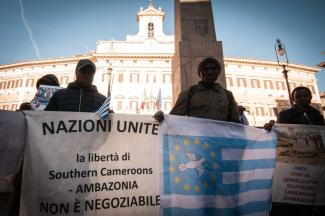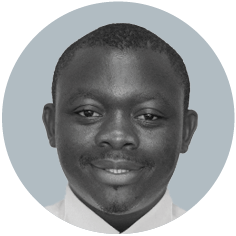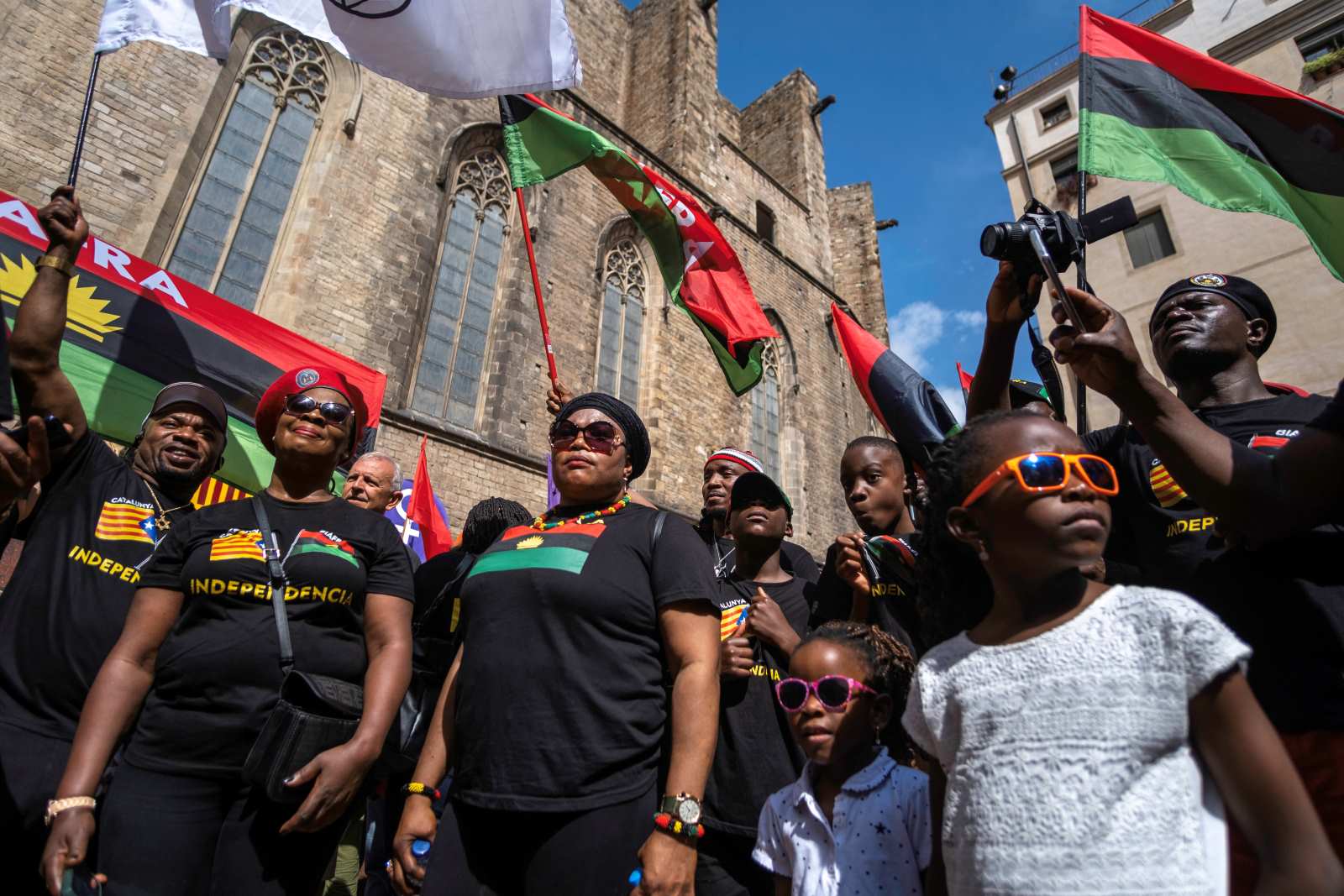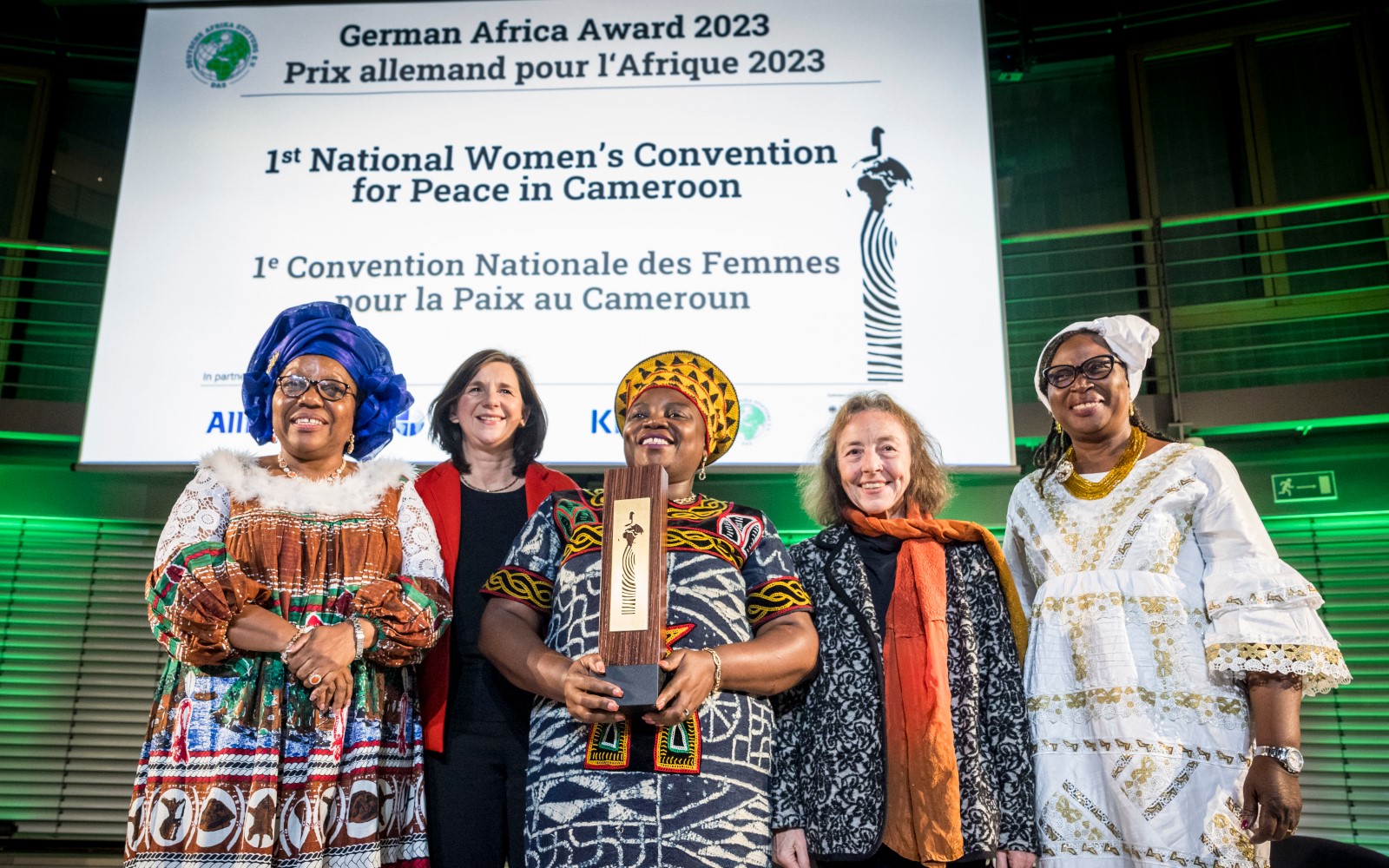Language politics in Cameroon
From colonial division to bloody conflict

At the beginning of April, Bamenda in western Cameroon, the country’s third largest city, witnessed a gruesome scene: the bloody head of a middle-aged man had been dumped in the middle of a busy road junction.
The man, who was later identified as a herbalist, was presumably abducted and then beheaded by secessionist rebels whose goal is an independent Anglophone Cameroon. His body was nowhere to be found.
The brutal murder is just the latest in a series of killings and other atrocities that have plagued the English-speaking parts of Cameroon. The separatists believe their victims oppose their cause or are government spies. In one of the killings that gripped the entire country in 2019 because it circulated as a video on social media, prison guard Ayafor Florence was dragged to a square in Pinyin and beheaded by a gang of men. Since 2016, the lives of Cameroon’s Anglophone population, which makes up around 20 % of the country’s 28 million inhabitants, have been shaken up by such acts.
The crisis has its origins in colonial power relations that date back to the 1880s. Before the European colonial powers subdued Africa, what is now Cameroon consisted of many independent kingdoms with their own territories, leadership, culture and traditions. But in the course of the scramble for Africa, Germany annexed these independent territories in 1884 and united them into one colony, which it called Kamerun. Things changed, however, when Germany lost the First World War to the Allies. The territory was seized and divided between Britain and France, with the French getting the lion’s share. Britain and France governed the divided colony as trustee territories – and introduced their language, government, education and judicial systems.
On 1 January 1960, French Cameroun became independent. The British Southern Cameroons followed on 1 October 1961 by joining French Cameroun to form the present-day Republic of Cameroon.
However, this was by no means a smooth process. The problems started during an UN-backed referendum in 1961 in the run-up to independence. At the time, a group of politicians from the British Southern Cameroons advocated independence through the creation of a new state. They rejected proposals to achieve independence by joining Nigeria or becoming part of Cameroon together with French Cameroun. However, the option of an independent Anglophone Cameroon was not put to a vote in the referendum.
In 1972, Cameroon’s first president, Ahmadou Ahidjo, ended the federal system that had guaranteed autonomy to the Anglophone minority. His successor Paul Biya, who has now been in power for almost 42 years, has centralised the administration even further.
Speaking English is not enough
Today, people in Cameroon are considered Anglophones if they come from the English-speaking regions of the North West and South West, which were formerly under British colonial rule as Southern Cameroons. Anglophones still have their own legal (common law) and education system modelled on the British system, which differs from the Francophone civil law and education system.
Meanwhile, some Francophones claim to be Anglophones simply because they can understand, speak and write English. This often leads to discord, especially when political posts that are actually intended to give a say to Anglophones are given to such people.
Furthermore, the loss of regional autonomy, economic disadvantage characterised by infrastructure decay and decades of underinvestment, the imposition of French in English-language schools and marginalisation through the appointment of French-speaking civil servants in the public sector are some of the factors that have led to growing frustration among Anglophones over the decades.
Strikes demanding respect
In 2016, a group of Anglophone lawyers and teachers in the North West and South West regions went on strike to demand fairer treatment and respect for Anglophone identity.
The Francophone-dominated government responded with brutal force by deploying its army’s elite group – the Rapid Intervention Battalion (BIR) – which is trained by the US and is normally used in the fight against Boko Haram.
The government’s use of disproportionate force radicalised many people who joined the groups fighting at gunpoint for the creation of an independent English-speaking state called “Ambazonia”.
The crisis has turned into a civil war between armed separatists and government troops and has been escalating ever since. Many civilians have been caught in the crossfire, as the rebels are waging a guerrilla war.
There have been attacks on schools, horrific killings, arbitrary arrests, abductions, arson attacks, rape, torture, mutilation, beheadings and other forms of horrific atrocities. According to human-rights groups, both the rebels and the government forces have committed these serious human-rights violations with impunity.
In the capital Yaoundé, 300 kilometres from the western regions, people who identify as Anglophones have also been victims of abuse. Neighbourhoods inhabited by Anglophones are searched and cordoned off unusually often.
So far, the tensions have led to the deaths of over 6000 people. They have destroyed the cultural and economic fabric of the troubled regions, impoverished many people and prevented over 700,000 children from attending school. So far, 628,000 people have been displaced within the country, while more than 65,000 have been registered as refugees in neighbouring Nigeria.
Ethnic groups divided
The Anglophone crisis in Cameroon is complex. Although it is often viewed in terms of the French-English language divide, it goes beyond language rivalry. The colonial divide has fragmented groups with common ethnicity, ancestry and cultural heritage. For example, the Mbo in Kupe Muanenguba Division speak English, but on the other side of the Mungo River, the Mbo speak French. At the same time, there are more and more marriages between couples from different ethnic groups, both Anglophone and Francophone.
It is therefore questionable whether it is really only the legacies of the Anglo-French colonial legacy that are proving to be profound indicators of identity in today’s Cameroon, when there was a multiplicity of identities before the division of the country.
Political scientist Bamnjo Herman Yenika from the University of Bamenda acknowledges that Anglophones have a distinct cultural and linguistic identity and that a sense of marginalisation and exclusion is fuelling conflict in the Anglophone community. However, he believes that the problem lies deeper than language and identity. “The Anglophone crisis is basically a political struggle with numerous resentments that have led to the current situation,” says Yenika.
In 2019, after the “Major National Dialogue” to end the long-running conflict, the government acknowledged that the Anglophone regions have a separate identity, although the country’s 1996 constitution already recognises this. The North West and South West regions have been granted special status, but many criticise the legal framework. Not only was it granted without proper consultation with key Anglophone stakeholders, but regional assemblies with limited legislative powers were established, whose members are elected in indirect elections and do not represent their constituencies.
But despite its limitations, Tilarious Atia, a Bamenda-based political scientist, argues that the special status could still serve to protect the Anglophone identity in Cameroon. “Instead of fighting, Anglophones should make better use of the special status,” he says.
Amindeh Blaise Atabong is a Cameroon-based freelance journalist who has reported on various topics from across Africa.
aamindehblaise@yahoo.com










